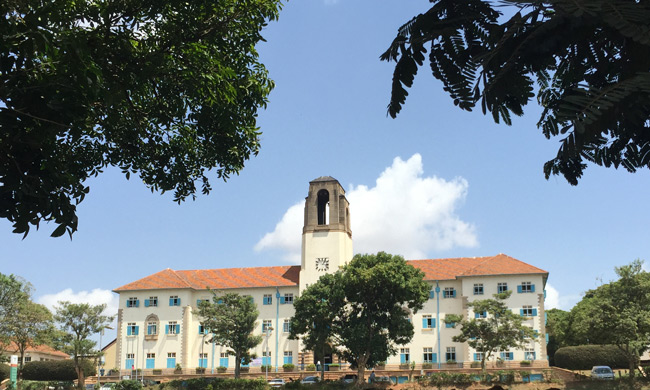The Academic Registrar, Makerere University invites applications from Ugandan, East African, S. Sudan and international applicants for the undergraduate programmes under the private sponsorship scheme for the 2020/2021 Academic year.
Each applicant should:
EITHER
have the Uganda Certificate of Education (UCE) with at least five passes, or its equivalent and at least two principal passes at Advanced Level (UACE) obtained at the same sitting. (For day programmes only candidates who sat A' level in 2019, 2018 and 2017 are eligible to apply. For evening, afternoon, and external programmes, a candidate is not restricted on the year of sitting A'level. (Detailed weighting system for programmes to be offered by Makerere University for the 2020/2021 Academic Year can be below under downloads. The cut-off points for previous academic years can be found here: https://www.mak.ac.ug/admissions/cut-points
Or
hold at least a Second Class/Credit (or equivalent classification) Diploma or otherwise as specified in the Diploma Holders' Requirements from a recognised chartered institution, relevant to the programme applied for. (Details of the Diploma Holders' admission requirements for the 2020/2021 academic year can be viewed on the notice board of the undergraduate Admissions Office or here: https://www.mak.ac.ug/application-procedures/diploma-holders
Or
(c) be a graduate from a recognised chartered university. The documents shall be received when the university reopens after the Covid-19 lockdown OR scan and send your documents to Email:ar@acadreg.mak.ac.ug.
How to apply:
(a) ALL APPLICANTS shall submit applications online (https://admissions.mak.ac.ug) but Diploma/Degree holders and internationals will have to submit certified copies of their transcripts and certificates and a passport size photograph to OFFICE 315, LEVEL 3, SENATE BUILDING when the university reopens OR SCAN AND SEND YOUR DOCUMENTS TO Email: ar@acadreg.mak.ac.ug
b) Other relevant information can be obtained from UNDERGRADUATE ADMISSIONS OFFICE, LEVEL 3, SENATE BUILDING, MAKERERE UNIVERSITY when the university reopens.
c) A non-refundable application fee of Shs.50,000/= for Ugandans, East African and S. Sudan applicants or $75 or equivalent for internationals, UGX.281,250= plus bank charge of UGX 2,750/= should be paid from the banks:
d) Candidates who hold Grades X, Y, Z, 7 AND 9 OF 'O' LEVEL results should not apply because they are not eligible for admission
E) Diploma Holder applicants who hold class three (3) diploma certificates or pass diplomas are not eligible for admission and therefore should not apply, except where stated in the diploma holders requirements.
Makerere University Online Application Portal User Guide
1. Applicants should access the Institution's Admissions URL https://admissions.mak.ac.ug
2. Signup using your Full Name, E-mail and Mobile Phone Number, please note that your name must be similar to the one on your supporting academic documents for your application to be considered valid. If you changed your names please go to Senate Building Office 301 (when the university reopens) with an affidavit supporting the name change.
3. A password will be sent to both your e-mail and mobile phone number.
4 The system will prompt you to change the password to the one you can easily remember.
5 To fill a form the applicant clicks on the APPLY NOW button displayed on the running scheme.
6 Obtain a payment advice slip by clicking on the "Pay for Form" button
7 Make a payment at any Bank
MOBILE MONEY PAYMENT STEPS:
1. Dail *272*6# on either Mtn or Airtel
2. Select option 3-Admission
3. Select option 3-Pay Fees
4. Enter reference number obtained from the application portal
5. Details of Application form will be confirmed
6. Enter PIN to confirm payment
7. Enter PIN to confirm payment
THE CLOSING DATE FOR APPLYING WILL BE TUESDAY 30th JUNE 2020.
WARNING:
(i)Applicants are strongly warned against presenting forged or other people's academic documents to support their applications for admission. The consequences, if discovered, are very grave indeed.
(ii) Do not buy any other documents not originating from the Academic Registrar's Office. Those who buy them do so at their own risk.
(iii) The Academic Registrar has not appointed any agents to act on his behalf to solicit for additional funds other than the application fee stated above.
ALFRED MASIKYE NAMOAH
ACADEMIC REGISTRAR
24th March 2020.


 General6 hours ago
General6 hours ago
 General6 hours ago
General6 hours ago
 Humanities & Social Sciences1 week ago
Humanities & Social Sciences1 week ago
 General1 week ago
General1 week ago
 Agriculture & Environment2 weeks ago
Agriculture & Environment2 weeks ago


